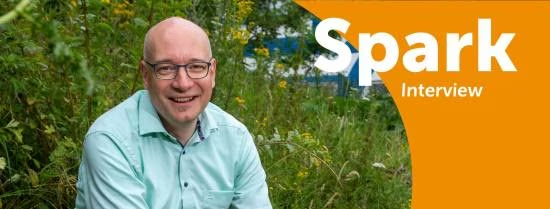On 1 November 2020, he became the academic director of the Institute for Housing and Urban Development Studies (IHS). After an international career, Dr. Dr. Lasse Gerrits chose an institute where he can capitalise on the existing potential. "IHS aims to improve the quality of life in cities through education, consulting and research. We are internationally oriented, a mix of students and professionals from all different countries and cultures. That’s our strength. Because I am convinced that you learn the most when you dare to put yourself in a completely new environment."
This is something that Lasse himself has experienced. After his studies (Public Administration) and career at Erasmus University Rotterdam, he moved to the Otto-Friedrich University in Bamberg, Germany, as a professor. "That step has brought me a lot," Lasse says. "If I hadn't started all over again somewhere else, I wouldn't have learned to work the way I do now."
Art and science
This working method is characterised by space for inspiration and movement. Although IHS is administratively part of two faculties of EUR (Erasmus School of Social and Behavioural Sciences and Erasmus School of Economics), according to Lasse it is an independent department with strong dynamics. He appreciates the space that is available for this own place at EUR: "It ensures that as part of EUR, IHS can also inspire, and that is mainly because of our international nature." As an art lover, Lasse sees a striking parallel: "Like art, science comes from moments of inspiration. Data itself doesn't tell a story; it's about the underlying idea. Inspiration makes you twist data a quarter turn to suddenly recognise a pattern." Lasse wishes for everyone to think outside the box. It enriches you both as a person and as a professional. According to him, for a university it means that you have to look at your education with an open, curious mind. Lasse: "Our way is only one way. If you want to improve quality permanently, the trick is to let go of everything you have taken for granted. This is easier if you dare to get out of your comfort zone. When you've experienced for yourself what it's like somewhere else."
Room to breathe
And that is a major challenge for the education system in the Netherlands, Lasse believes. "I think there needs to be more space and time for the personal development that students go through during their education. In Germany, this is called ’Bildung’: formative education. We have over-organised education in the Netherlands into a predictable system. We are primarily focused on returns, while reflection is relegated to the background. But studying isn't just about learning subjects, is it? It is also the right time to shape yourself and your image of society. And sometimes, some discord and conflict should be part of that. You learn the most when they let go of your hand at some point, to explore on your own. It is very healthy that at some point you ask yourself: what am I actually doing here? Give students room to breathe."
Learning from abroad
Asked about future plans for IHS, Lasse is clear: "There is a lot of untapped potential at IHS, especially in the area of research. We are originally focused on helping developing countries improve. Our knowledge in this respect is very valuable, for many more countries. We want to share that. And we want to learn even more from 'across the border' based on an inquisitive attitude."
- More information
This interview previously appeared in Spark magazine. This magazine is for students, alumni and partners of ESSB and showcases the positive impact that the faculty's education and research have on society.

